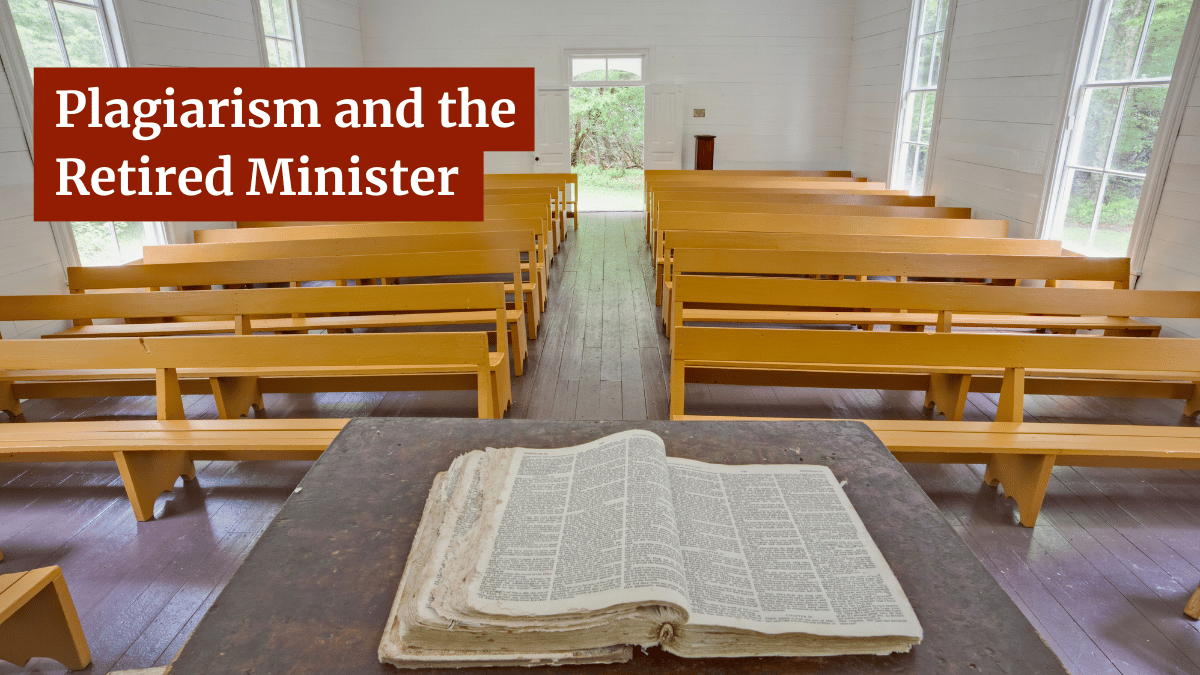Plagiarism and the Retired Minister

The New York Times Magazine features a column entitled The Ethicist, written by Kwame Anthony Appiah that is published twice per week. In each edition, the column answers a reader question regarding ethics in difficult situations.
The March 22 column asked a simple question: Should I confront our former minister over his plagiarized sermons?
In the question, an anonymous reader explained the situation. They, along with others, were working on creating a bound volume of their now-retired minister’s past 10 years of sermons. The aim was to put the book in their library and make a digital version available to members.
However, as they compiled the volume, they quickly realized that many of the sermons were plagiarized. This included at least one personal story that the minister told and various other elements. The plagiarism was widespread, up to five instances in a single sermon, and came from a wide variety of sources.
The letter writer said that they are now at the end of the project and presented their findings to the church’s president, who encouraged them to stop proofing, make a bound copy for the retired minister and then only provide digital copies upon request.
The author then says that, while they do not want to publicly shame this minister, they are wondering if they should approach the minister directly and let them know that they are aware of the issue. That, in turn, is the primary question that they presented the ethicist with.
Appiah, for his part, cites the roman poet Martial and the first plagiarism case while pointing to the tradition of non-original storytelling and the inherit complexities with dealing with pastoral plagiarism.
However, in the end, he asks why she wants him to know, is it a measure of punishment/revenge or a way to get some of your own self-respect back for being made to “look like fools.” He stops short of giving direct advice but indicates that the letter writer is already buffering their desire to punish with compassion.
But, while that may be an accurate answer, it feels like an incomplete answer. As someone who is focused on plagiarism and the ethics around citation, this feels like a missed opportunity not only to address the situation at hand, but to help improve the church moving forward.
The Complexities of Pastoral Plagiarism
To make an understatement, the intersection of religion and plagiarism is a fraught one. Both are passionate topics that inspire deep division, inflamed emotions and prone to heated conversations.
Making things even more difficult is that different religions and even different institutions within a religion, often have vastly different standards when it comes to plagiarism. Some churches require their preachers concoct their sermons on the fly with no planning, others are fine with copied and repeated sermons without attribution if they speak to the beliefs of the congregation.
There is no singular standard for what constitutions plagiarism by a religious leader. If you ask a thousand leaders their take on it, you will likely get a thousand very different answers.
That said, the way the letter writer describes their situation, it does seem as if the minister involved breached their trust. Not only did this minister tell plagiarized “personal” stories, something Appiah described as “dishonest,” but the fact the letter writer feels betrayed as do others working on the project speaks to the fact that this goes against the cultural norm of that church.
What, if anything, to do about it is a difficult question.
To be clear, this minister has retired. There is no way to fire them or discipline them through the traditional means. That opportunity has passed. If we have already ruled out public shaming, which the author has, then there really is not much “punishment” that can be delivered.
So, I agree with Appiah, the decision of to confront the minister or not is a personal one and that must be informed by their moral code, which is likely informed by their religious experience.
However, where I disagree with Appiah is leaving it there. Both the letter writer’s question and Appiah’s answer only looks backward. They need to be looking forward.
Looking Forward, Not Backward
The issue I have with the column is a simple one: While the ethical question is a thorny one for all the reasons discussed above, there is an easy win here that can help the church and its leadership as they move forward.
Unless the minister involved was being deliberately nefarious, there was likely a disconnect between the minister and the expectations of the congregation.
The question that I have is simple: Why not learn from this incident and set clear expectations and guidelines for all sermons moving forward?
Rather than focusing on what to do with the retired minister, why not focus on how to prevent this from happening again? Options are limited when it comes to dealing with past plagiarisms, but there are much greater opportunities for preventing and responding to future ones.
Such a policy would need to include what the expectations of originality and citation are of a sermon or other church publications, a process for detecting such plagiarism and a set of repercussions should the policy be violated.
To that end, it seems whatever editing process they were doing for this book detected the plagiarism very well. Perhaps instituting that process as an ongoing one, maybe with the intent of releasing regular books of sermons, could help.
Overall, this is a real opportunity for this church and, if by some miracle this letter writer reads this, I would encourage them to seize the opportunity to have a frank discussion with church leaders about plagiarism and set up rules and processes to address it moving forward.
You are limited to what you can do with past plagiarism, especially by someone who has retired, but the future is fully unwritten.
Bottom Line
In addition to everything above, I would also caution against broad distribution of this book. If the plagiarism is serious enough, depending on the sources pulled from, it could raise serious copyright issues.
Though a lawsuit over such a book is unlikely for a myriad of reasons, I would not encourage them to invite any trouble, especially if they feel the work is dishonest.
That said, the real question here is not “What do we do with this retired minister?” but “What do we do to prevent this in the future?”
If you can craft a full and complete answer to that question, then something positive will come out of this.
In the end, my years of working in this space have turned me into something of a pragmatist when it comes to the ethics of plagiarism. Having ethical standards is important, but without systems in place to detect and enforce violations of those standards, they are meaningless.
This is a powerful lesson that this church, and other institutions, can learn from. While there may not be much of an opportunity to right the wrongs that have already taken place, there is one to prevent future issues.
I would focus my energies there, where the most good can be done, for both the church and the integrity of its leaders.
Want to Reuse or Republish this Content?
If you want to feature this article in your site, classroom or elsewhere, just let us know! We usually grant permission within 24 hours.
